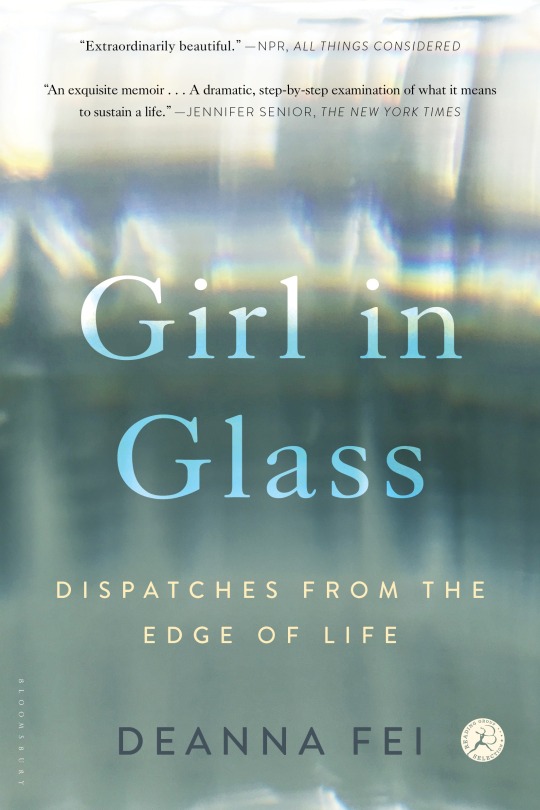Conversations: Danica Novgorodoff Interviews Deanna Fei
“Writing this book allowed me to heal—and to give something back”
Deanna Fei is the author of the widely acclaimed memoir Girl in Glass (Bloomsbury), hailed as “exquisite” by The New York Times and “extraordinarily beautiful” by NPR. Her story has been featured on the Today Show, PBS NewsHour, NPR’s All Things Considered, and MSNBC. She is also the author of the award-winning novel A Thread of Sky (Penguin, 2010). She was born in Flushing, New York, and graduated from Amherst College and the Iowa Writers’ Workshop. She has received a Fulbright Grant and a New York Foundation for the Arts Fellowship (Fiction ‘06).
Danica Novgorodoff (Fellow in Fiction ‘15) interviewed Deanna about parenting, writing from personal experience, medical privacy, and her current work.
DN: In 2014, you wrote an article “My Baby and AOL’s Bottom Line” in Slate Magazine in response to AOL’s cuts to employee retirement benefits, which CEO Tim Armstrong blamed on the company’s expensive coverage of two “distressed babies”—one of whom was yours. After surviving a firestorm over corporate accounting and medical privacy, how did you decide to turn your experience into a book? Also, the media uproar occurred in 2014, and your book was released in 2015—how did you write a book so quickly?
DF: There’s so much shame and silence that surrounds a traumatic birth. Until my daughter was publicly singled out as a financial burden, I had never been able to imagine ever telling the story of how she arrived in the world. But as those headlines about “distressed babies” became a full-blown firestorm, I realized that I needed to speak out to defend her basic humanity.
I never expected the story to go viral. I never expected to receive an outpouring of messages from strangers around the world who thanked me for giving voice to them, too. So many of them had also been steeped in shame over a premature birth or a special-needs child. Many of them had also suffered blame and scrutiny from employers and insurers just because they’d suffered a medical crisis. They opened my eyes to a frightening and complex set of issues that I’d only begun to explore. They showed me why it’s so important to break down those walls of shame and silence to tell the full story of my daughter’s journey. Truly, their support and solidarity saved me – and they inspired me to write GIRL IN GLASS.
The book explores some terrifying questions: How do you parent a baby you could lose at any moment? What does it mean to exist at the edge of life? But it’s also a celebration of love and resilience and the force of a child’s will to live.
I’m generally a slow writer—finishing the first draft of my first novel took me about five years—but I wrote this book in eight months. It was the toughest, rawest writing I’ve ever done, and also the most necessary. Writing this book allowed me to heal—and to give something back. It carried me from profound trauma and isolation to a place of wonder and gratitude. And it gave me a whole new understanding of why we need to tell our stories: To know that we have a right to exist as we are, that we are fully human in our vulnerability. To know that we’re not alone, and to help others feel less alone.

DN: The words “failure,” “guilt,” and “shame” come up many times in your book. Though it seems indisputable that the medical emergency of your daughter’s premature birth was completely outside of your control, you struggled with feelings of failure as a mother. Why does childbirth engender so much guilt that another catastrophe, like suffering a car crash, might not? Why do feelings of shame keep so many people from speaking out against corporate injustice? And how did you move forward from that shame?
DF: The specific nature of my daughter’s birth–catastrophically premature, with no warning signs or medical explanation—left me with a visceral sense of having failed to hold onto to my own child. This came from my individual psyche, of course, but it also reflects something very insidious in how we view risk and responsibility in the areas of pregnancy and motherhood.
Our culture tends to preach that women can do everything right and then have a perfect baby. What To Expect When You’re Expecting has become our modern-day bible. We have so much information at our fingertips that it can give us the illusion of having more control than we really do. That easily becomes a culture of blame when something goes wrong. I think a lot of women heap blame on themselves over experiences that shatter that myth of perfect pregnancy and childbirth, but I also think there’s a tremendous social stigma. We, as a society, don’t know how to honor and acknowledge these experiences. Even on the level of language and narrative, we don’t allow space for these kinds of stories to be told. So they become unspeakable.
In terms of the socioeconomic context, ours is a country where we still treat health care as a privilege rather than a basic human right, where corporations tend to apply a zero-sum mentality to worker benefits, where we blame the insanely high costs of care on the sick instead of the health care industry. It’s now two years after the AOL controversy, and I still hear from people who were shamed at company meetings for having a baby in the NICU, people who were suddenly fired when a family member needed expensive medical treatment. It’s no wonder most of them are afraid to speak out. But until we do, this will continue to be business as usual.
DN: How has this ordeal changed the way you think and act about privacy?
DF: I was always the kind of person who shrugged about Facebook privacy settings, customized Gmail ads, even those disclosure forms at doctor’s offices. But then the most profound trauma in the life of my family was exposed by my husband’s CEO for the purpose of justifying corporate cost-cutting, and I began to see how vulnerable we all are to having our most personal information used against us by institutions that hold power over us. This is especially dangerous in the area of medical privacy. I never envisioned myself as a privacy advocate, but I definitely feel a sense of responsibility to tell my story in a way that helps people understand why medical privacy matters to all of us—parents, employees, anyone who might suffer a medical crisis.
Medical privacy is an issue that can seem pretty abstract. But where it really hit home for me was in realizing how violations of medical privacy can expose the most profound traumas of people’s lives—and make them vulnerable to getting blamed, shamed, even fired for their medical bills. That’s why medical privacy is an issue of basic civil rights. The way things stand now, ordinary people can’t protect themselves from being discriminated against for their medical conditions. As we entrust more and more of our medical records to Big Data, the laws that are supposed to protect us are increasingly weak and outdated. We need to push for strong federal privacy laws that guard our personal health information in the digital age.
DN: You write, “From the moment I first laid eyes on my son, I would have died for him. But some days, I couldn’t stop weeping.” Can you talk about that extraordinary combination of love and sorrow that parenthood breeds? Do you think it brings new depth to your writing?
DF: As parents, we want to protect our kids from all the suffering in the world, but sometimes we can’t. Life is inherently fragile and uncertain, and that’s part of the beauty of it all.
My son, who was 13 months old when my daughter arrived, taught me that, even through the darkest times, you have to find moments to laugh and sing and dance. My daughter taught me how to face my worst fears. She had no choice but to fight for every breath. She had no idea the odds that were against her, the uncertainties about her future, the fact that, for a lot of the earliest part of her life — and it’s painful to admit — I was afraid to become attached to her because I knew that I could lose her at any moment. She really showed me how to live in each moment knowing that you might not get the next one.
In writing, you have to give it everything you’ve got. You can’t hold back or let yourself be guided by fear. And you can’t know how it’s going to turn out in the end. Until my daughter was born, I don’t think I knew just how dark life could get, and how wide the unknown really is. But there’s also a particular transcendence about the kind of love I learned from my kids. It’s an elemental force, and it has to be its own reward. To this day, when my daughter says things like, “Mama, I see the moon!”, that stills my heart. In writing, you have to go to the darkest places in order to have those moments of transcendence.
DN: When did you receive a NYFA award, and how did it affect your work and career?
DF: I received my NYFA grant in 2006. It was totally transformative for me. Financially, the grant allowed me to forge on with the research and writing of my first novel, A THREAD OF SKY, which was set in present-day China. The job I’d left behind in New York was cocktail waitressing at a sports bar in Bayside, so I don’t think I can overstate the fact that the money was very real to me. But what mattered even more was the vote of confidence. The sense that an organization with such a long history of supporting artists was investing in me, a girl with barely a publication to her name. That a committee of writers was saying that my voice mattered. I’ll always be grateful to NYFA for that.
DN: What are you working on now?
DF: I’m working on a new novel about a war correspondent who survives three months of captivity in Afghanistan–and then loses her own mother to suicide. It’s about trauma and grief and the human condition in extremis. But it’s also about love and salvation and building a new life. It feels completely different from anything I’ve ever written before, but I guess it also feels like the book I was fated to write at this moment.
Find out more about Deanna on her website and see her read along with Pulitzer Prize-winning poet Gregory Pardlo (Fellow ‘05), Shelly Oria (Finalist ‘15), and Teddy Wayne (Finalist ‘12) on Thursday, April 28, 7:00 PM at McNally Jackson Books in New York City.
– Danica Novgorodoff
Danica Novgorodoff is an artist, writer, graphic novelist and horse wrangler from Kentucky who currently lives in Brooklyn, NY. Her graphic novels include The Undertaking of Lily Chen, Refresh, Refresh, Slow Storm, and A Late Freeze. Find out more about Danica on her website.
NYFA’s Artists’ Fellowship program awards $7,000 cash grants to artists living in New York State. This year marks the 30th anniversary of the program and NYFA is celebrating with events and online content. Follow #NYFAFellows30 on social media for updates.





